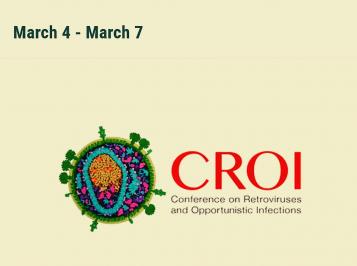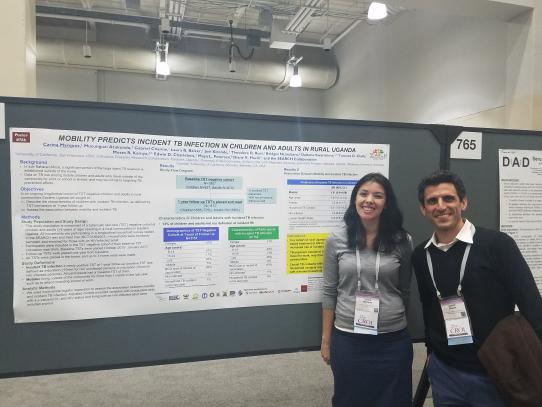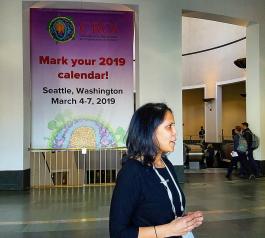UCSF Breaks Adherence, Prevention Research News at CROI 2018
Proving again leadership in the field, UCSF brought an impressive showing and groundbreaking findings to the 25th Conference on Retroviruses and Opportunistic Infections. From headlining workshops and symposia, to heavily trafficked poster presentations (nearly 50 featuring UCSF authors) and engaging oral abstracts, we’d like to share some highlights from CROI 2018.

Launching the week's events was the community-led Martin Delaney Memorial Lecture, which this year focused on women in research. UCSF Professor and ZSFGH Ward 86 Medical Director Dr. Monica Gandhi was headliner for “Science is Better when Women Are Represented,” with a talk called “Mentoring Women in Biomedical Research,” a topic she knows intimately as the co-Director of the UCSF-Gladstone CFAR Mentoring Program.
The opening session of the conference was especially celebratory given CROI’s 25th anniversary. The N’Galy-Mann Lecture was given by Dr. Elizabeth Bukusi, of KEMRI and FACES, and a longtime UCSF collaborator. Her remarks, which she titled “Mich mar Geno – The Gift of Hope,” were a thoughtful retrospective on progress made – “my co-conspirators helped bring me to where I am today,” she laughed, and a harbinger of what’s to come – “[Now I think] it’s possible that my son will see a world without HIV,” she said in closing.
This set a tone for both reflection and action at the conference, and researchers did not disappoint.
Gandhi’s presence at the conference hardly dimmed, as her study measuring HIV treatment adherence via hair samples was breaking news for multiple outlets. Accuracy in measuring a patient’s adherence is crucial, Gandhi says, and “self-report is not the best way to measure it.” Her project – the first to examine levels of medication in treatment naïve patients in a trial – was couched in an ACTG study, allowing for access to 2,192 person-visits in 599 participants. Those patients with hair antiretroviral levels in the lowest tertile had significantly increased risk treatment failure.
Day one also proved illuminating for global HIV and TB experts. Findings that showed a one month antibiotic regimen to prevent active TB disease is at least as safe and effective as the current standard nine-month therapy was particularly good news for some of our HIV/TB research and implementation experts working to prevent, diagnose, and treat in resource poor settings where treatment adherence is especially difficult.
Drs. Carina Marquez and Gabriel Chamie, whose work is embedded in SEARCH, looked at mobility (among adults who leave their community for work, or children who leave for school) and TB risk –crucial to understand for prevention efforts – and found that in rural Uganda mobility was in fact a predictor of TB – associated with an alarming 2.6-fold increased odds of TB incident infection.

Drs. Carina Marquez and Gabriel Chamie
This was only the beginning – with vaulted appreciation, for the first time in its 25-year run, CROI featured a plenary session on mental health and HIV. The session underscored the notably higher prevalence of mental health issues like depression among those who are HIV-positive, and how they lead to increased risk behaviors, poorer engagement, and worse health outcomes.
UCSF investigator Dr. Susan Meffert has understood the importance and impact of this relationship for years, and her poster detailed her most recent research findings. She and colleagues looked at 2,335 people living with HIV in Kenya, Uganda, and Tanzania, and discovered that depression was significantly associated with high viral load – independent of treatment adherence. Viral loads of those suffering from depression were nearly double that of those in better mental health. Results highlighted the importance of incorporating strong mental health interventions in tandem with other clinical treatments for those living with HIV.
Mental health isn’t the only area in need of increasing attention – HIV research focused on women is gaining ground, and influential results sure to impact the field were widespread at CROI. Startling findings presented by Dr. Renee Hoffren of University of Washington indicated that women were nearly three times more likely to become infected with HIV while they were pregnant – and four times as likely in the six months after giving birth – compared with the risk of contracting it any other time. UCSF CAPS investigator Dr. Sheri Lippman presented her encouraging findings on young women using – and getting their partners to use – HIV self-test kits in South Africa at remarkable rates compared to clinic-only testing, complementing her research on MSM communities in the same region. These global gender disparities pose sobering new research questions for those in the field.
There were also compelling domestic findings for those working to end health disparities prevention and treatment. Dr. Susan Buchbinder, UCSF Professor of Medicine and Director of Bridge HIV at the San Francisco Department of Public Health (SFDPH), and an expert in PrEP delivery and uptake in San Francisco as she co-leads the Getting to Zero initiative, focused much of her discussion in her oral abstract session – Getting to Zero New Diagnoses in San Francisco: What will It Take? – on the importance of partnerships.
“To the extent that you can partner with other clinicians, and community-based organizations, health departments, researchers, is really helpful,” she noted later, especially when striving to eradicate some of the most glaring disparities in HIV prevention and treatment.
It’s largely worked for her and colleagues – San Francisco went from 4400 people on PrEP in 2014, to 16,000-20,000 people today, and she emphasized that this is due to the outreach and capacity building with providers. Improvement is still needed, Buchbinder says, as “we’re seeing increases in all racial and ethnic groups, but not nearly enough among African-American individuals,” noting the need for better outreach to the African-American communities to better understand why this is and rectify it. With the findings of rapidly growing HIV clusters increasing, targeted prevention models are even more pressing.
In this area, our young investigators made a particularly strong showing – an uplifting way to end the conference on a tone of possibility. Oliver Bacon, of UCSF and the SFDPH, presented results that sent audible murmurs through the crowd, when he showed that average time from diagnosis to treatment initiation in San Francisco fell to an astonishing 6 days, thanks to the SFDPH-ZSFGH-UCSF RAPID program. Dr. Angelo Clemenzi-Allen explained that housing instability is associated with poor viral load suppression, and Dr. Monika Roy showed that defining patients as ‘clinically stable’ – those who don’t need as frequent clinic/healthcare provider visits – can be difficult but is important for a few reasons.

Dr. Monika Roy
“How long does it take someone once they’re enrolled in care to become clinically stable, and once they become stable, how long do they stay that way? What are they reasons they become unstable?” Roy asks. This is so essential, she emphasizes, because it helps “program implementers actually implement their programs more effectively,” thereby increasingly everything from adherence to treatment of comorbidities. (Dr. Monika Roy works closely with UCSF physician Dr. Elvin Geng, and her research was tied to Geng and colleagues’ recent work on true mortality among those on antiretroviral medication across Zambia.)
This focus on implementation is prescient, ARI Director Dr. Paul Volberding says. “The field of HIV has changed so dramatically from the first CROI to this 25th. To me, the challenge now [in HIV], is really one of implementation as much as anything else, and each of the presenters and investigators from our teams at this conference are doing incredible work to answer the most pressing questions in this area:
“How do we find people who are infected? How do we get them into care, and keep them in care?”
With these complementary researchers in house, it seems likely that UCSF will be the place to figure that out.
Note: Adding to our reach, we’re thrilled that MedPage Today produced a video series dedicated to featuring some of our leading investigators and their research at CROI: Drs. Paul Volberding, Susan Buchbinder, Asa Clemenzi-Allen, Monica Gandhi, Monika Roy, Matthew Spinelli, and Oliver Bacon, which we’re very proud to share.
By Larkin Callaghan. Contact: [email protected]
